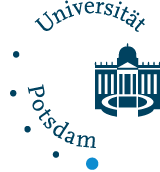Position CRC1644/B22 – PhD student Schneider group
The successful candidate will work 26 hours per week (65%), employed at the University of Potsdam. The position is classified within remuneration group E13 of the collective wage agreement among the German states (TV-L). The fixed term of employment (3-year contract) is in accordance with Section 2 Subsection 1 of the German Act on Limited Scientific Contracts (Wissenschaftszeitvertragsgesetz or WissZeitVG).
Your field of work:
We are seeking a diligent PhD student with an independent, solution-oriented, open mindset, excellent teamwork and communication skills, curiosity, and a knack for interdisciplinary thinking. This position involves exploring Arabidopsis thaliana’s phenotypic plasticity under water limitation to identify key genes in this agronomically significant response.
The PhD student will further develop and redesign existing analytical methods for measuring seedling growth to create a quantitative tool that can be used both within and outside the CRC 1644. This will involve using computer vision techniques such as image analysis, quantification, machine learning, and pattern recognition. Although the project has a computational focus, we expect the applicant to have a strong interest in developing interdisciplinary skills, including mastery of microscopy methods, creating reproducible imaging protocols, and interacting with scientists from other disciplines. Additionally, the project will utilize extensive phenotyping data of Arabidopsis to explore the genetic basis of their response to water limitation, employing techniques like GWAS in collaboration with project Z2.
Joining our team offers opportunities to develop skills in computer-assisted (automated) image analysis, advanced microscopy techniques, and modern methods in quantitative biology & genetics. These skills are currently in high demand, opening up excellent career opportunities in both academic and non-academic fields. For more information, please see the project summary on the B2 project page and visit our lab’s website: https://schneider-lab.de/.
Your responsibilities:
• develop automated image analysis scripts and reproducible imaging pipelines for root-, tissue-, and cell-scale optical recordings
• integrate techniques of computer vision into a user-friendly tool used across the CRC and beyond
• apply modern pattern recognition and quantification tools to uncover principles of pattern emergence in biology
Results from your work on this project form the basis for your doctorate/PhD.
Your qualifications:
Please see here for the mandatory requirements for this position: https://www.uni-potsdam.de/en/ppp/job-portal/jobs
Apply with evidence of outstanding grades in one or more of the following disciplines: Bioinformatics or Computer Science, (Computer) Engineering, Cell or Molecular Biology, Physics or Maths. Prior specialization in plant science is helpful but not required. Practical knowledge in one of the following areas is desirable:
- computer-aided image analysis and development of (semi-)automatic quantification tools (e.g. Fiji/ImageJ)
- programming skills in Matlab, R, Python, Java or other languages
- modern microscopy techniques (confocal, fluorescence, super-resolution)
- computer science, e.g., machine-learning / neuronal network approaches
- technology, e.g., 3D printing and raspberry-based robot development
- computational biology and quantitative genetics
- GitHub
What we offer:
Please see here for working conditions at the University of Potsdam: Employment at UP
How to apply:
Please follow the instructions here: https://www.uni-potsdam.de/en/ppp/job-portal/jobs
The deadline for applications is 30 August 2024.
